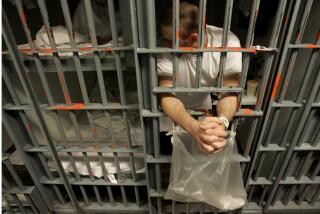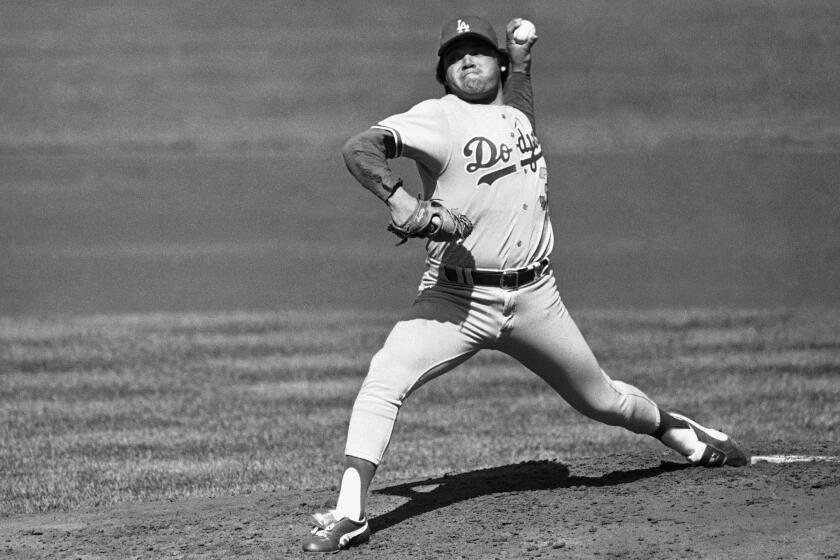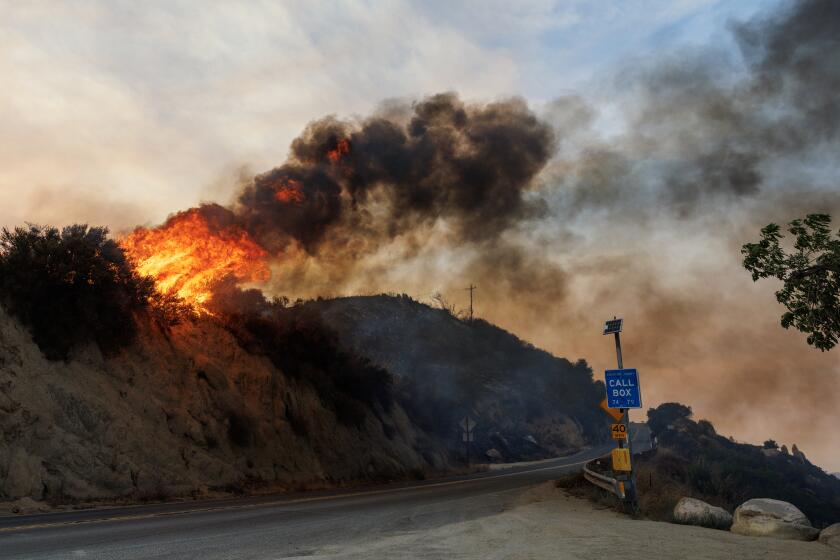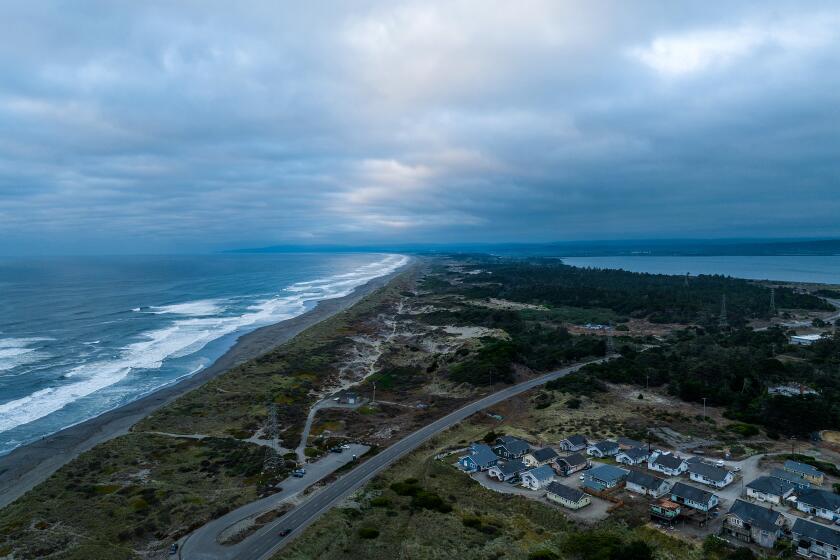Column: Mourners are as diverse as the victims of the massacre
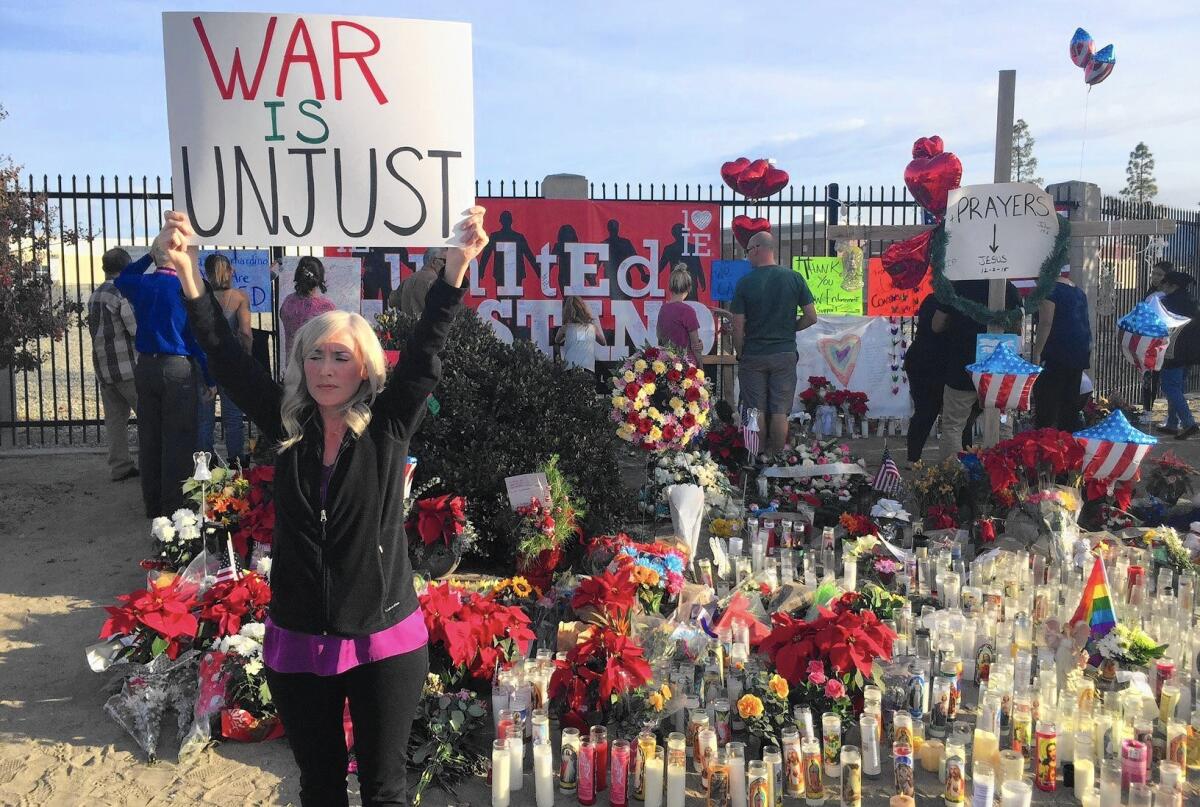
Tamara Farsadi of Irvine holds a sign Sunday at the growing memorial for the victims of the mass shooting at the Inland Regional Center in San Bernardino.
The vehicles pulled up to an intersection that once meant nothing but is now memorialized — a steady stream of cars and trucks and vans carrying people who needed to be present.
The doors opened and out came the couples, the families, the devout, the curious, a traveling canine ministry, a rabbi and his sons.
Some held candles and others brought flowers to add to the growing collection at Waterman Avenue and Orange Show Road in San Bernardino. They came early Sunday and into the evening, from nearby and from as far away as Oceanside, to honor the dead.
In conversations with visitors, I encountered no one who personally knew any of the 14 people who were killed Wednesday at a workplace Christmas party just up the street, slaughtered in a cowardly act of terrorism by a husband and wife team of Muslim extremists.
“I’m just here to pay my respects,” said Charles Turner, a Fontana retiree.
The massacre unfolded just up the block, but police had that area cordoned off. So the vigil was set up at the corner, across from a Shell station, an auto repair shop and an empty lot in the southern flats of San Bernardino. From there, you could gaze north to a sharp mountain ridge painted onto a powder blue canvas.
“May God bless our city. Condolences & love to the families of the 14,” someone had written on a poster covered with such messages.
One visitor had hung red and green Christmas stockings on a sturdy green bush, and each stocking bore the name of a victim.
If you have seen photos of the dead, you were looking at the California yearbook. They were white, Asian, African American, Latino. One had fled Eritrea to escape violence, another had come from the Middle East for the same reason.
The visitors to the vigil looked like them.
“I want to support my community,” said Dinah Valverde, a Highland resident who attends Harvest Christian Fellowship and wore a red shirt that asked “Need Prayer?”
She found a cool draft of shade under a tree and sat waiting to receive anyone who needed to talk.
About 3 p.m., I asked how long she’d been there.
“Since 8 a.m.,” she said. “I don’t understand this kind of horrific crime, but my husband passed and I know a little about death.”
There was little in the way of politics on display during my time at the vigil — most people arrived quietly and left the same way, their only statement being their solemn presence.
Turner, the Fontana retiree, did tell me he thought President Obama was doing far too little to protect Americans, and the answer might be to send troops into battle against ISIS.
On the other side of that argument, Maureen Farsadi and her daughter, Tamara, had driven up from Irvine and Corona del Mar to hold two signs overhead for as long as their arms would allow.
“Peace is Possible,” said Maureen’s, and “War is Unjust,” said Tamara’s.
Maureen Farsadi’s late husband was Persian, she said, and a non-practicing Muslim. She and her daughter are Christian.
“What we’re doing isn’t working,” said Tamara, who believes bombing raids on ISIS will bring more blowback.
Pearl Sanchez arrived with her husband, Henry, after services at their nearby church, and Pearl had a message for Maureen Farsadi.
“God is great,” she said with conviction. “He’s going to do something good for us.”
Alyssa Torres, 14, of Hesperia, who arrived with her mom and dad and two younger siblings, expressed perfectly the insanity of a murderous rampage, against innocent people carried out in the name of faith.
“It doesn’t make sense,” she said.
Chaplain Ralph Buchhorn of the Extra Mile K9 Response Team brings trained “comfort” dogs to the scene of mass shootings in the hope that they’ll be a healing presence and conversation starters for people who need to talk. With the national barrage of mass killings, the dogs unfortunately get way too much work. But Buchhorn and his dogs can only do so much.
“There is no answer to the ‘Why,’” he said.
A vigil is not a place for answers. It’s an occasion for reflection, communion and recognition.
“I had to stand aside,” said Sam Romero, who stepped back from the vigil, surprised by how overcome he was.
Romero, who works in the communications department at Cal State San Bernardino, told me he was born in the city and loves it still. Sure, he said, San Bernardino has taken its hits. It went bankrupt, it got belted by economic decline even as other parts of the state prospered, and now it is home to the second-largest act of terrorism on American soil since 9/11.
“But I look at this,” he said of the diverse gathering of an extended family in mourning, “and I see another part of San Bernardino. There’s a small-town feel here. I go to the store and see people I know. I love the mountains. There’s culture here. There’s a university.”
As the afternoon faded into evening, Rabbi Sholom Ber Harlig set up a table next to the vigil and placed a menorah atop it. He gazed west, using the sun as a timepiece, and spoke up when the sky darkened and the air cooled.
“Tonight is a special holiday which is called Hanukkah,” said the rabbi, telling the story of the survival more than 2,000 years ago of the holy temple in Jerusalem.
“Hanukkah comes to teach us that if you go in a room, and the room is dark, you don’t have to take a stick and start fighting with the dark.... A little light gets rid of a lot of darkness.”
The vigil candles became brighter with each passing minute, and red clouds floated atop the Inland Empire sky. For every person who left, another person arrived to pay respects.
They knew, as do all of us, that we are at the mercy of things unseen.
Twitter: @LATstevelopez
ALSO
A look at the K-1 visa that gave San Bernardino shooter entry into U.S.
Couple had been radicalized ‘for quite some time’ before attack, officials say
San Bernardino shooting vigil: Victim was ‘Superman,’ friends say
More to Read
Sign up for Essential California
The most important California stories and recommendations in your inbox every morning.
You may occasionally receive promotional content from the Los Angeles Times.


